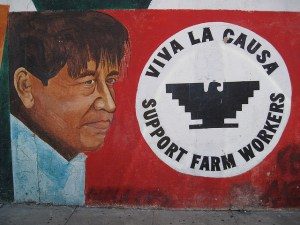We had to opportunity to hear Willie’s personal story, and saw his unending passion for his work in trying to save kids from a life of gang violence in the streets. It was unlike any individual’s story I had heard before. Through his work now, he seeks to expose kids who are already affiliated with gangs, or at-risk of doing so, to ideas about what they can really be in life. Willie’s ability to relate to the young people that he works with gives him a unique opportunity, and his courage and dedication to his personal mission was evident in every word he shared. It is not possible to recapture his story, but it taught us a great deal about the psychology of gangs, which I found to have applicable lessons to various situations of violence.

Salinas is a small city with a reputation that proceeds it. Associations that frequently come to mind are that of the ‘salad bowl,’ the ripple effects of the massive agriculture business, the plight of the farm workers seeking to build a better life, and a surprising amount of violence given the population size. Gang activity has come to be a label that defines East Salinas, but the gangs were not always associated with violence. One of the principle gangs in the Salinas area began as an effort to create unity among farm workers, and work to protect the vulnerable campesinos that labor arduous hours under difficult conditions. It was founded on the beliefs of Cesar Chavez, who professed nonviolence. He was a civil rights leader who led a social movement to bring attention to the struggle of farm workers. The gang also sought to look out for the protection of this population whose challenges are rarely prioritized by society. However, Chavez’s focus on principles of nonviolence were overlooked. Gang tensions in Salinas were traditionally between those that see themselves as assimilated, and the ‘newcomers’ to the area, although this line has become blurred. We learned that despite this rivalry, 90% of violence occurs between members of the same gang. This points to a great hypocrisy. The original purpose of the organization became distorted, as it has long since transformed into a violent group that harms the same individuals that it was initially seeking to offer greater equality.

This type of transition certainly exists elsewhere, and it perplexes me. There are numerous instances of what begins as a call for justice, ultimately becomes a poisonous apple involving cycles of violence. Groups and organizations that originally aim to stand up for the plights of the marginalized, sometimes transform into something that perpetrates violence against these populations that are most in need of protection. Peru’s sendero luminoso began in the late 1970’s, and aimed create a new democracy and Maoist utopian society, led by a regime where the impoverished rural population would ultimately provide leadership. The sendero luminoso became an armed terrorist group that caused thousands of deaths, principally of indigenous farmers that it had sought to offer opportunity. FARC (Revolutionary Armed Forces of Colombia) was initially founded to address the staggering inequality in the nation, but ultimately became a guerrilla army, notorious throughout Latin America and the world. The indigenous population and rural communities ultimately suffered disproportionately during the Colombian armed conflict from 1964 – 2017. In the anti-apartheid resistance movement, various groups that fought to upend the entrenched political, economic and social marginalization of all non-whites ended up perpetrating terrifying acts of violence against one another. Is it because systems of power seem untouchable? In the face of desperation and structural violence, do tensions boil over to those that are facing similar circumstances? It strikes me as a mysterious and terrible pattern. Our speaker described the depth of psychological manipulation that he experienced, which offers insight into what allows this transition to take place.

Willie was drawn into the gang because of his desire to be a part of something with a purpose, with a cause of bettering his people, where he played a role, and felt a sense of unity. This is obviously something that all humans need and desire. Unfortunately, this need can be deeply misused and can result in a perpetuating cycles of violence against the disenfranchised. Messages of fairness can turn into indoctrination, lies and manipulation. Everyone needs to hear a message that they belong and are needed. It is a matter of who is delivering that message and their motives. The education system and societies must allocate resources and opportunities to offer that message to all individuals. Otherwise, those that most need to hear that their have a role in society can fall victim to evolving messages about how equality and opportunity will be brought to their communities.

